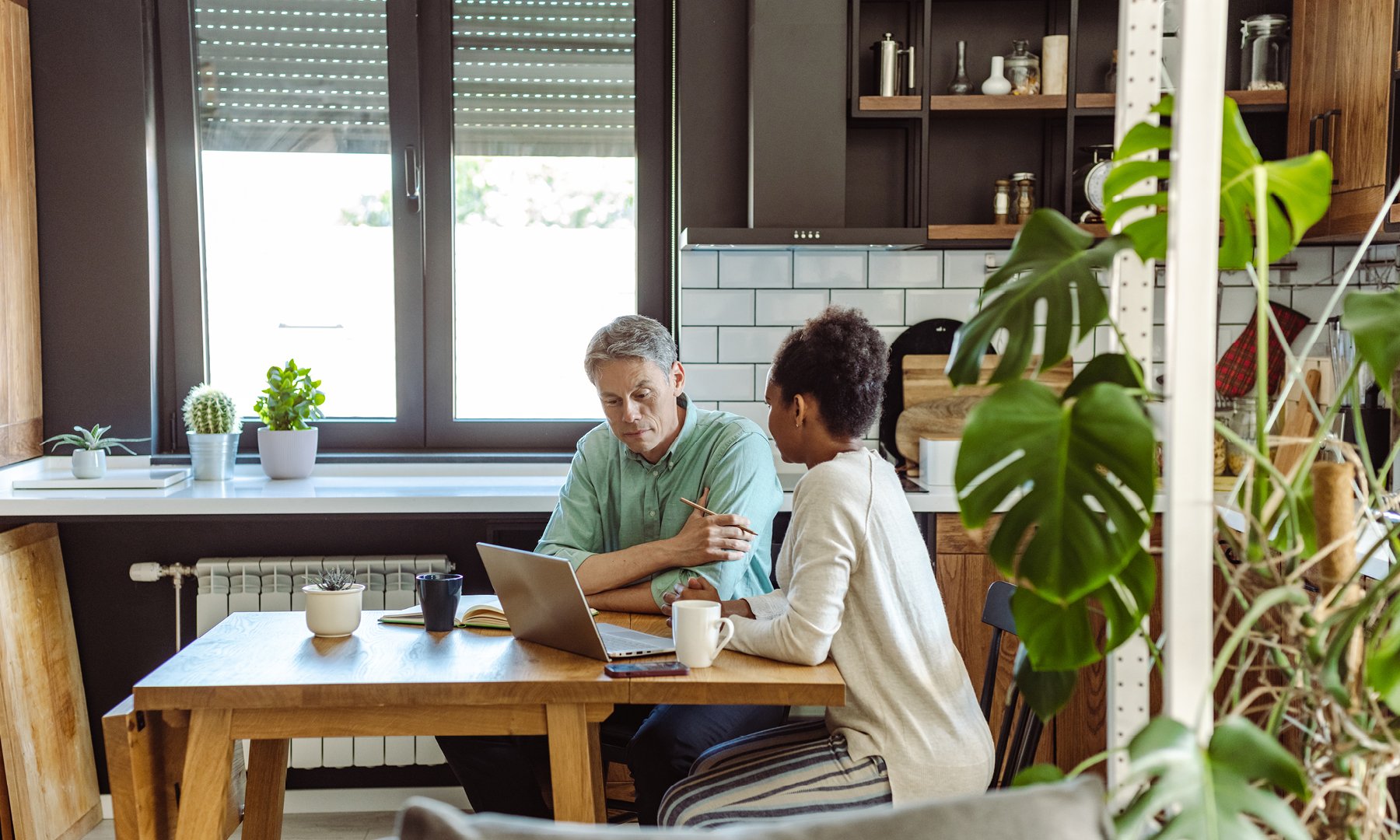4 min read
5 Benefits of an Organized Financial Life
 Guy Hockerman, CPA, CFP®, Financial Planning Manager, Commerce Trust Company
:
Dec 2, 2022 7:00:00 AM
Guy Hockerman, CPA, CFP®, Financial Planning Manager, Commerce Trust Company
:
Dec 2, 2022 7:00:00 AM

Money problems impact our lives everyday — some through no fault of our own. Perhaps you were a victim of identity theft, which put all your private information and financial accounts at risk. Maybe you mailed your mortgage payment, and it never reached your lender. What about the time you were carrying a large amount of cash and your purse or wallet was stolen?
Most of us can relate to the frustration, anxiety, time, and effort it takes to deal with inconvenient and costly financial glitches like these. In retrospect, having all your account information in one place likely would have made the tedious recovery process much easier, quicker, and more efficient.
As hard as it is to admit, the majority of our money issues happen under circumstances we do control. In all fairness, everyone loses or misplaces money occasionally. But it’s one thing to find a $50 bill in an old coat pocket — quite another to forget about a former company 401(k) account containing thousands of dollars.
Frankly, costly situations happen regularly with our finances because of one big money problem many of us have in common: disorganization.
The benefits of taking control of your finances
1. Know your net worth. This one task may be the most important benefit of organizing your financial life. While the
process may be a bit tedious, the end result can be quite rewarding. Once you’ve calculated your total assets minus
your liabilities, you can take control of your finances by:
● Setting short-term and long-term financial goals for your future
● Creating or adjusting your budget
● Monitoring your spending
● Tracking all your bank accounts, investments, loans, credit cards, real estate holdings, personal property,
business valuation, insurance policies, and more
You’re probably wondering if it’s worth the time and effort to gather all this information and consolidate your documents in one place. The answer is “yes” — not only for your peace of mind, but also for those you love. Unfortunately, if something happens to you and your financial accounts are not organized in one place, it could take months or years to distribute your assets. In the U.S. alone, approximately one out of every ten individuals has abandoned property in their name waiting to be claimed.² Currently, an estimated $58 billion in unclaimed cash and benefits is being held for beneficiaries by states, federal agencies, businesses, and other organizations.³

Having your net worth documented, account records archived in one place, and access to important information shared with those you trust will help you control current financial problems as they arise and avoid lengthy wealth transfer issues once you’re gone. Most important, you will have peace of mind knowing you’ve done your part to help your family and team of financial, tax, and legal professionals apply for and claim benefits, get through the probate process, close financial accounts, and pay any final estate or income taxes.
2. Save time and energy. Consolidating your financial records will ultimately ensure that when you need a specific piece of information or documentation, it will be in an easily accessible, convenient place. Having a manual spreadsheet, software, or online system to handle and store routine paperwork, important documents, and monthly bills in one specific location eliminates hours of backtracking and searching for misplaced documents — not to mention sifting through shoeboxes, drawers, and closets for lost statements and receipts that are never found.
3. Organization becomes routine. A routine, by nature, is the act of repeating the same pattern over and over until you eventually do it without thinking. The ultimate goal of getting organized is no different. For instance, when you go through your mail, don’t just glance at it and throw it on the kitchen counter. Take a minute to pull out the bills and place them in a particular spot until you’re ready to pay them. This action will quickly become routine, and you’re one step closer to an organized financial life.
4. Feel more spontaneous and energetic. Once you organize your financial life, you’ll have more spare time to do the things you want and tackle other projects that have been weighing on your mind. You can be more spontaneous because you know your financial life is in order, and that’s a huge accomplishment. Clearing out the clutter and organizing even one part of your life not only removes stress and anxiety, it also can be energizing. Treat yourself — go away for the weekend or plan a family outing.
5. Build confidence. It’s always a good feeling to finish a task you’ve put off for months, maybe even years. Clutter and disorganization can erode self-confidence, and that shows up in all aspects of your personal, business, and social relationships. But once you get one aspect of your life organized, it’s easier to move on to the next challenge. You’ll not only gain confidence in yourself, but also in your ability to handle and control all aspects of your financial life going forward.
We can help
Having an accurate, real-time view of your net worth is an important part of determining whether you’re headed in the right direction and able to meet your financial and retirement goals. A Commerce Trust advisor can help you take steps toward enjoying the benefits of an organized financial life and finding peace of mind for you and your loved ones. Contact us today.
¹ Source: Erin Huffstetler, thebalance.com, “4 Steps to Start Organizing Your Finances,” https://www.thebalancemoney.com/organize-your-finances-1389025, updated July 12, 2021.
² Source: National Association of Unclaimed Property Administrators, “What is unclaimed property?” https://unclaimed.org/what-is-unclaimed-property/, accessed November 8, 2022.
³ Source: golookup.com, “Unclaimed Money Statistics,” https://golookup.com/unclaimed-money/unclaimed-money-statistics, updated November 8, 2022. Certified Financial Planner Board of Standards, Inc. (CFP Board) owns the certification marks CFP® and CERTIFIED FINANCIAL PLANNER™ in the United
States, which it authorizes use of by individuals who successfully complete CFP Board’s initial and ongoing certification requirements.
The opinions and other information in the commentary are provided as of December 2, 2022. This summary is intended to provide general information only, and may be of value to the reader and audience.
This material is not a recommendation of any particular investment or insurance strategy, is not based on any particular financial situation or need, and is not intended to replace the advice of a qualified tax advisor or investment professional. While Commerce may provide information or express opinions from time to time, such information or opinions are subject to change, are not offered as professional tax, insurance or legal advice, and may not be relied on as such.
Data contained herein from third-party providers is obtained from what are considered reliable sources. However, its accuracy, completeness or reliability
cannot be guaranteed.
Commerce Trust is a division of Commerce Bank.
NOT FDIC INSURED | MAY LOSE VALUE | NO BANK GUARANTEE COMMERCE TRUST IS A DIVISION OF COMMERCE BANK.
As hard as it is to admit, the majority of our money issues happen under circumstances we do control. In all fairness, everyone loses or misplaces money occasionally. But it’s one thing to find a $50 bill in an old coat pocket — quite another to forget about a former company 401(k) account containing thousands of dollars.
Frankly, costly situations happen regularly with our finances because of one big money problem many of us have in common: disorganization.
The benefits of taking control of your finances
1. Know your net worth. This one task may be the most important benefit of organizing your financial life. While the
process may be a bit tedious, the end result can be quite rewarding. Once you’ve calculated your total assets minus
your liabilities, you can take control of your finances by:
● Setting short-term and long-term financial goals for your future
● Creating or adjusting your budget
● Monitoring your spending
● Tracking all your bank accounts, investments, loans, credit cards, real estate holdings, personal property,
business valuation, insurance policies, and more
You’re probably wondering if it’s worth the time and effort to gather all this information and consolidate your documents in one place. The answer is “yes” — not only for your peace of mind, but also for those you love. Unfortunately, if something happens to you and your financial accounts are not organized in one place, it could take months or years to distribute your assets. In the U.S. alone, approximately one out of every ten individuals has abandoned property in their name waiting to be claimed.² Currently, an estimated $58 billion in unclaimed cash and benefits is being held for beneficiaries by states, federal agencies, businesses, and other organizations.³

Having your net worth documented, account records archived in one place, and access to important information shared with those you trust will help you control current financial problems as they arise and avoid lengthy wealth transfer issues once you’re gone. Most important, you will have peace of mind knowing you’ve done your part to help your family and team of financial, tax, and legal professionals apply for and claim benefits, get through the probate process, close financial accounts, and pay any final estate or income taxes.
2. Save time and energy. Consolidating your financial records will ultimately ensure that when you need a specific piece of information or documentation, it will be in an easily accessible, convenient place. Having a manual spreadsheet, software, or online system to handle and store routine paperwork, important documents, and monthly bills in one specific location eliminates hours of backtracking and searching for misplaced documents — not to mention sifting through shoeboxes, drawers, and closets for lost statements and receipts that are never found.
3. Organization becomes routine. A routine, by nature, is the act of repeating the same pattern over and over until you eventually do it without thinking. The ultimate goal of getting organized is no different. For instance, when you go through your mail, don’t just glance at it and throw it on the kitchen counter. Take a minute to pull out the bills and place them in a particular spot until you’re ready to pay them. This action will quickly become routine, and you’re one step closer to an organized financial life.
4. Feel more spontaneous and energetic. Once you organize your financial life, you’ll have more spare time to do the things you want and tackle other projects that have been weighing on your mind. You can be more spontaneous because you know your financial life is in order, and that’s a huge accomplishment. Clearing out the clutter and organizing even one part of your life not only removes stress and anxiety, it also can be energizing. Treat yourself — go away for the weekend or plan a family outing.
5. Build confidence. It’s always a good feeling to finish a task you’ve put off for months, maybe even years. Clutter and disorganization can erode self-confidence, and that shows up in all aspects of your personal, business, and social relationships. But once you get one aspect of your life organized, it’s easier to move on to the next challenge. You’ll not only gain confidence in yourself, but also in your ability to handle and control all aspects of your financial life going forward.
We can help
Having an accurate, real-time view of your net worth is an important part of determining whether you’re headed in the right direction and able to meet your financial and retirement goals. A Commerce Trust advisor can help you take steps toward enjoying the benefits of an organized financial life and finding peace of mind for you and your loved ones. Contact us today.
¹ Source: Erin Huffstetler, thebalance.com, “4 Steps to Start Organizing Your Finances,” https://www.thebalancemoney.com/organize-your-finances-1389025, updated July 12, 2021.
² Source: National Association of Unclaimed Property Administrators, “What is unclaimed property?” https://unclaimed.org/what-is-unclaimed-property/, accessed November 8, 2022.
³ Source: golookup.com, “Unclaimed Money Statistics,” https://golookup.com/unclaimed-money/unclaimed-money-statistics, updated November 8, 2022. Certified Financial Planner Board of Standards, Inc. (CFP Board) owns the certification marks CFP® and CERTIFIED FINANCIAL PLANNER™ in the United
States, which it authorizes use of by individuals who successfully complete CFP Board’s initial and ongoing certification requirements.
The opinions and other information in the commentary are provided as of December 2, 2022. This summary is intended to provide general information only, and may be of value to the reader and audience.
This material is not a recommendation of any particular investment or insurance strategy, is not based on any particular financial situation or need, and is not intended to replace the advice of a qualified tax advisor or investment professional. While Commerce may provide information or express opinions from time to time, such information or opinions are subject to change, are not offered as professional tax, insurance or legal advice, and may not be relied on as such.
Data contained herein from third-party providers is obtained from what are considered reliable sources. However, its accuracy, completeness or reliability
cannot be guaranteed.
Commerce Trust is a division of Commerce Bank.
NOT FDIC INSURED | MAY LOSE VALUE | NO BANK GUARANTEE COMMERCE TRUST IS A DIVISION OF COMMERCE BANK.
